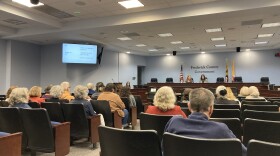Diversity and inclusion are the ‘Frederick way’ said County Executive Jessica Fitzwater at Frederick’s annual State of the County Address last night.
Residents were joined by state, county and city officials in Emmitsburg as Fitzwater highlighted the partnerships that strengthened the fastest growing county in the state.
The county executive said it's not always easy having hard conversations, and it’s especially difficult seeing eye to eye when someone tells you you’re wrong. Despite this, she says she is still dedicated to meeting with people who think differently. “When we put people together who disagree agreeably and we ask them to solve problems, they are going to find solutions that are creative and outcome oriented,” Fitzwater explained.
While the county executive pointed to difficult relationships at the federal level, she said that isn’t how things work in Frederick.

Federal Shutdown
More than 12,000 federal workers call Frederick home, making up 11% of the county’s workforce. In the face of the federal shutdown, the county executive announced efforts to expand health benefits and raised the minimum wage for full-time county employees to $21.
Fitzwater described actions taken by the current administration as taking a sledgehammer to civil services. “What’s happening in DC shows a complete disregard for the value of public service and a total disrespect for people who have dedicated themselves to others,” Fitzwater said.
Emphasizing the importance of public service, Fitzwater said she’s concerned federal actions could leave long lasting damage.
Affordable Housing
Fitzwater announced the county was appraising its own land to address the county’s ongoing affordable housing issue. “This is just the first milestone in our work to transform underutilized county land into housing for those in [the] greatest need,” Fitzwater said.
150 affordable housing units will be developed, the county executive said, next to Frederick’s Prospect Center, a community resource hub currently under construction.
This comes as 30% of Frederick residents live below the ALICE threshold, which stands for asset limited, income constrained but employed. These families live above the national poverty level but still struggle to make ends meet.
With the cost of housing in Frederick so high, residents are being priced out of their own communities, Fitzwater said, making it more difficult for them to live where they work.
Data Centers
As the county continues to court data centers, residents have raised concerns over the environmental impacts construction may cause. Fitzwater announced residents near Frederick’s current data center campus, Quantum Frederick (QF), which sits just north of Adamstown, will be eligible for free well water testing. “We have approached [data centers] the Frederick County way, with an inclusive work group which made recommendations to policy makers,” Fitzwater explained. “...We have made data centers the most regulated industry in Frederick County.”
QF sits on approximately 2,100 acres of land, of which a small portion constitutes a brownfield site. Brownfield sites are former industrial locations that may be contaminated.
The land previously hosted the Alcoa Eastalco aluminum smelting plant and was found to have groundwater and soil contamination risks. The Maryland Department of the Environment and the former owner formed an environmental covenant that limits the use of the land by all future owners.
Education
To address overcrowding in Frederick schools, Fitzwater reaffirmed the county’s commitment to constructing a Linganore Creek Elementary School by next school year. This comes after several other projects to renovate or replace aging school infrastructure across 2025. “We are doing something that no other Maryland county and school system has done,” Fitzwater explained. “We are building a new school in one year.”
As Frederick remains the fastest growing county in the state, so too is its school system. With more than 48,000 students, some schools are seeing as many as 30 or 40 students per classroom.
Parents have raised concerns that their students are not getting enough one-on-one time with their teachers. This has extended to staff working with special needs students. Additional concerns over safety have been raised, with parents asking if students will have enough space to move in an emergency.







